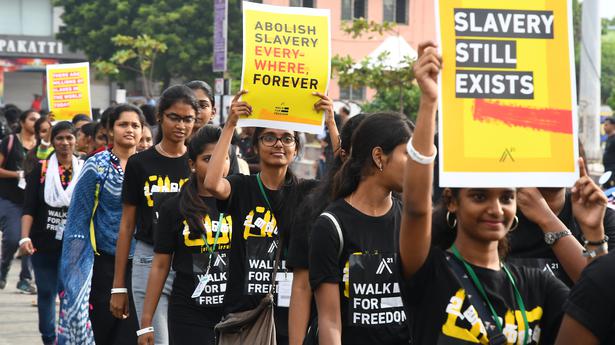
Conviction in human trafficking cases drops in the country
The Hindu
This is despite the rise of Anti Human Trafficking Units
Twice every week, two women from Basanti in West Bengal’s South 24 Parganas, visit a local non-governmental organisation at the subdivision headquarters from their village, seeking details of the investigation in the case relating to their rescue from traffickers. These women in their twenties were rescued four to five years ago, but there has been no conviction of the accused in the cases involving them.
Details of the conviction of cases involving human trafficking shared in Parliament earlier this month points out that the conviction rate in human trafficking cases has been declining over the past four years. The number of Anti Human Trafficking Units (AHTU) in the country has increased to 696. AHTUs are specialised investigation units with the law enforcement that were created upon the directive of the Ministry of Home Affairs in 2008, by state governments in their respective states.
The conviction rate of cases related to human trafficking dropped from 27.8% in 2016 to 10.6% in 2020. Between 2018 and 2019 the conviction rate in such cases increased from 19.4% to 22.5%. The data has been sourced from a reply by Minister of State for Home Affairs, Ajay Kumar Mishra to a question in the Rajya Sabha earlier this month.
Tafteesh, a collective action platform that works towards combating human trafficking also raised the issue of decline in conviction rate of trafficking cases and blamed it to “absence of a strong and robust mechanism to investigate human trafficking cases that often span across state borders leading to acquittal of traffickers across the country”.
Kaushik Gupta, a lawyer practicing at Calcutta High Court and member of Tafteesh said that low conviction rate is due to the problems and fallacies in the investigation.
“Though the crime is usually an organised and an interstate one, the investigation is rarely interstate. And since this is a case of circumstantial evidence until and unless the chain of circumstance is shown to be completed, conviction cannot be based on such evidence. Therefore, the low conviction rate is due to the problem and fallacies in investigation,” Mr. Gupta said.
Advocate Gupta emphasised that survivors of human trafficking are adequately and promptly compensated so that they also find it in their interest to pursue their case and add proper evidence to ensure conviction.













